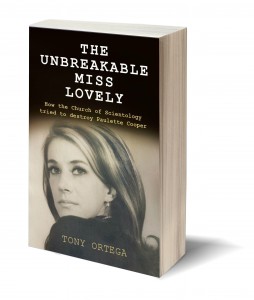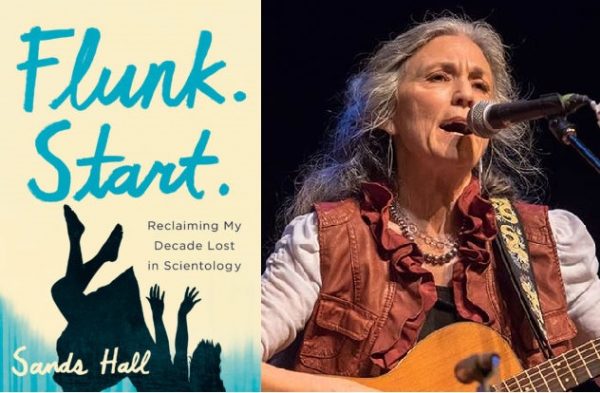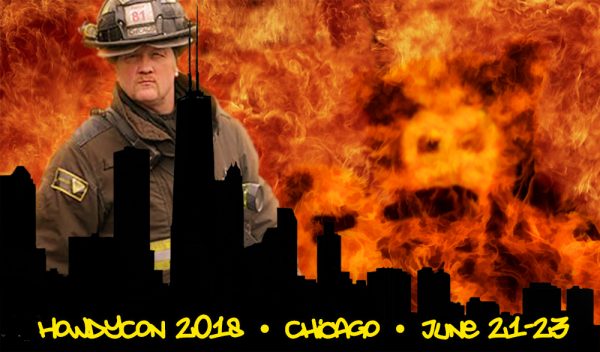When the first notices for a memoir about Scientology coming out by author Sands Hall started appearing online some months ago, we distinctly remember former Scientologists and other Scientology watchers asking, “Sands who?”
Scientology memoirs are much more common today than they were just a few years ago now that the church’s terror machine has been disrupted somewhat, but they still tend to be written by people whose names are well known in the ex-Scientology community: Janis Gillham Grady, Karen Pressley, Ron Miscavige, Leah Remini — just to name a few from the last couple of years, each of them very well known before their books came out.
Hall points out herself that she isn’t a former Scientology celebrity like Leah Remini, and she’s also not a former high-ranking Sea Org official dishing new revelations about the inner workings of the church.
But her decades as an author, playwright, and musician is what really sets this book apart: Sands Hall is an experienced literary talent and writing teacher whose seven years in Scientology from about 1982 to 1989 may not provide new revelations about Scientology’s controversies, but they do provide some of the most penetrating, illuminating prose about how an educated and skeptical person could get so deeply into, and then struggle to escape, what everyone around her warned was a dangerous cult.
Another thing setting this book apart is that so much of it isn’t about Scientology but about Hall’s fascinating life journey as the daughter of a well known novelist, Oakley Hall, and how she and her older brother, Tad (known professionally as Oakley Hall III), both struggled to make their own way as artists under their father’s weighty reputation.
Sands is quite self-aware about how good she had it growing up: Her famous father and her mother, Barbara, provided the sort of home that most people would kill for. The world-traveling Halls were immersed in a life of books and authors and wine-soaked parties and an ongoing pursuit of a meaningful life. How could someone brought up in that kind of loving family and utter support be sucked into, of all things, Scientology?
As Tad’s self-destructive habits derailed his path as a playwright, Sands found her own journey disrupted as she struggled as an actor in New York and Los Angeles. Through a friend, she managed to get into the acting classes of Milton Katselas, a Scientologist we’ve written about numerous times and whose Beverly Hills Playhouse was a major conduit to Scientology. Later, she met a bassist, Jamie Faunt, who played with Chick Corea. Hall was charmed by Faunt, but she couldn’t believe that she was falling for a Scientologist — every step of the way, she seemed very aware of how wrong it was even to entertain the idea.
But describing a gathering with Faunt and his fellow musicians, she captures the sense of her objections starting to melt away as these intelligent, talented people described Scientology’s metaphysical concepts in the best possible light. A better world, focused on improvement from within, and helping your fellow man? Against her own misgivings, she felt herself getting swept into it.
Along the way, Hall does a brilliant job helping the reader learn the vocabulary and concepts of Scientology in a manner that many others have tried, but few with such facility. Readers with no knowledge of Scientology will find themselves thinking in terms of the overt-motivator sequence and the conditions, and without having to take courses at their local org. Hall takes us through the lingo as she does the Comm Course, PTS/SP, the Purif, Hubbard Qualified Scientologist, and also trains at the Advanced Org in Los Angeles so she can become a Course Supervisor at a mission in Beverly Hills.
Throughout these steps deeper into the church, she tells us she has doubts. But she also admits that she simply didn’t see much of the abuse that came out later in the accounts by former Sea Org members and high ranking officials. She heard about the RPF, and about David Mayo being declared, and about some other things, but it would be many years before she learned the extent of it. Even in her relatively low-level position, she could see how insidious Scientology’s mindset was, and how it was stifling her career, encouraging her to push away her family, and putting her into a philosophical hamster wheel that became incredibly difficult to escape from.
Hall anticipates that her book won’t please everyone. She knows that friends she’s had in Scientology who she managed to hang onto after leaving the church will “disconnect” from her for writing the book. But she knows also that Scientology critics will have reason to complain as well.
“There may be those who attack the book for not being harder on the Church, who will insist that the things I found effective are so much psychobabble,” she says, and we expect that will be the case. She still describes experiences she had in the “training routines” or in auditing in mystical terms that “independent Scientologists” will hail and church critics will jeer, for example.
But many former Scientologists will tell you that there is “good” in L. Ron Hubbard’s work, that their early experiences in Scientology were valuable, even if they later felt betrayed by an increasingly authoritarian organization under the leadership of David Miscavige. In that regard, Hall is very much like many of the former Scientologists we’ve talked to.
Maybe that’s why, time and again, the characters we most identified with in Hall’s memoir were her parents, who couldn’t believe that they’d raised a Scientologist. We really enjoyed the scene when Hall tried to explain to her father — a novelist — that Scientology’s great value was that it had taught her how to use dictionaries and look up the etymology of words. You can practically see his veins popping in his forehead.
We would have loved to have a glass of wine with Oakley and Barbara Hall.
And heck, maybe we’ll get a chance to raise a glass with Sands. But we may just have to get into it with her about all that woo and the TRs, sheesh.
Flunk. Start.: Reclaiming My Decade Lost in Scientology
By Sands Hall
Published by Counterpoint
March 1, 2018
——————–
Make your plans now!
Head over to our HowdyCon 2018 website to start making your travel plans!
——————–
Bernie Headley has not seen his daughter Stephanie in 5,038 days.
Katrina Reyes has not seen her mother Yelena in 1,641 days
Brian Sheen has not seen his grandson Leo in 184 days.
Clarissa Adams has not seen her parents Walter and Irmin Huber in 1,247 days.
Carol Nyburg has not seen her daughter Nancy in 2,021 days.
Jamie Sorrentini Lugli has not seen her father Irving in 2,795 days.
Quailynn McDaniel has not seen her brother Sean in 2,141 days.
Claudio and Renata Lugli have not seen their son Flavio in 2,635 days.
Sara Goldberg has not seen her daughter Ashley in 1,675 days.
Lori Hodgson has not seen her son Jeremy and daughter Jessica in 1,387 days.
Marie Bilheimer has not seen her mother June in 913 days.
Joe Reaiche has not seen his daughter Alanna Masterson in 5,002 days
Derek Bloch has not seen his father Darren in 2,142 days.
Cindy Plahuta has not seen her daughter Kara in 2,462 days.
Claire Headley has not seen her mother Gen in 2,437 days.
Ramana Dienes-Browning has not seen her mother Jancis in 793 days.
Mike Rinder has not seen his son Benjamin and daughter Taryn in 5,095 days.
Brian Sheen has not seen his daughter Spring in 1,201 days.
Skip Young has not seen his daughters Megan and Alexis in 1,604 days.
Mary Kahn has not seen her son Sammy in 1,476 days.
Lois Reisdorf has not seen her son Craig in 1,058 days.
Phil and Willie Jones have not seen their son Mike and daughter Emily in 1,563 days.
Mary Jane Sterne has not seen her daughter Samantha in 1,807 days.
Kate Bornstein has not seen her daughter Jessica in 12,916 days.
——————–
 Posted by Tony Ortega on February 27, 2018 at 07:00
Posted by Tony Ortega on February 27, 2018 at 07:00
E-mail tips and story ideas to tonyo94 AT gmail DOT com or follow us on Twitter. We post behind-the-scenes updates at our Facebook author page. After every new story we send out an alert to our e-mail list and our FB page.
Our book, The Unbreakable Miss Lovely: How the Church of Scientology tried to destroy Paulette Cooper, is on sale at Amazon in paperback, Kindle, and audiobook versions. We’ve posted photographs of Paulette and scenes from her life at a separate location. Reader Sookie put together a complete index. More information can also be found at the book’s dedicated page.
The Best of the Underground Bunker, 1995-2017 Just starting out here? We’ve picked out the most important stories we’ve covered here at the Undergound Bunker (2012-2017), The Village Voice (2008-2012), New Times Los Angeles (1999-2002) and the Phoenix New Times (1995-1999)
Learn about Scientology with our numerous series with experts…
BLOGGING DIANETICS: We read Scientology’s founding text cover to cover with the help of L.A. attorney and former church member Vance Woodward
UP THE BRIDGE: Claire Headley and Bruce Hines train us as Scientologists
GETTING OUR ETHICS IN: Jefferson Hawkins explains Scientology’s system of justice
SCIENTOLOGY MYTHBUSTING: Historian Jon Atack discusses key Scientology concepts
Other links: Shelly Miscavige, ten years gone | The Lisa McPherson story told in real time | The Cathriona White stories | The Leah Remini ‘Knowledge Reports’ | Hear audio of a Scientology excommunication | Scientology’s little day care of horrors | Whatever happened to Steve Fishman? | Felony charges for Scientology’s drug rehab scam | Why Scientology digs bomb-proof vaults in the desert | PZ Myers reads L. Ron Hubbard’s “A History of Man” | Scientology’s Master Spies | The mystery of the richest Scientologist and his wayward sons | Scientology’s shocking mistreatment of the mentally ill | The Underground Bunker’s Official Theme Song | The Underground Bunker FAQ








